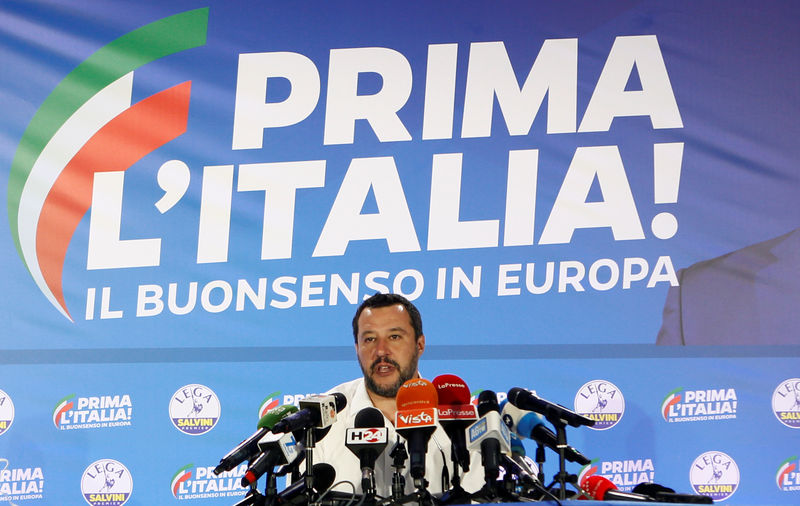By Robin Emmott and Alastair Macdonald
BRUSSELS (Reuters) - Parties committed to closer European Union integration began bargaining over jobs and policy on Monday after an election to the EU parliament which fragmented the center but gave only limited gains to nationalists.
National leaders of the bloc, many of whom hailed the vote as a vindication, will meet to chart the next steps on Tuesday.
Matteo Salvini, Italian deputy prime minister, leader of the anti-immigration League and potential builder of a far-right alliance across Europe, said his 34% of the Italian national vote was a mandate to rip up euro zone budget austerity rules.
But despite other wins for eurosceptics in big countries, including France, Poland and would-be ex-member Britain, the result was taken as a vote of confidence by mainstream leaders after turnout surged and nationalists advanced only modestly.
(GRAPHIC: Results of elections to the European Parliament - https://tmsnrt.rs/2HvZs1M)
"The European elections were tangible proof that European democracy is alive and well," Margaritis Schinas, chief spokesman of the executive European Commission, told reporters.
"The populists didn't win this election."
Facing a more hostile Russia, China's growing economic might and an unpredictable U.S. President Donald Trump, many Europeans appeared to heed a message that the EU needed to stick together to protect workers' rights, free speech and democracy. Turnout rose to 51% from just 43% in the last election in 2014.
Salvini, calling the shots in Rome and who now emerges as leader of a potential new European Parliament group hostile to the Brussels establishment, told a news conference: "The time has come to totally re-discuss old and outdated rules that have hurt Europe. Otherwise a vote like this cannot be explained."
But the far-right and other nationalists, including Nigel Farage's triumphant new Brexit Party, Marine Le Pen's National Rally, which edged President Emmanuel Macron's liberals in France, and the ruling parties of Poland and Hungary may find it hard to overcome long-standing differences and turn what may be about a quarter of Parliament's seats into a united force.
LEADERS TO MEET
The 28 EU national leaders, including outgoing British Prime Minister Theresa May, will meet over dinner in Brussels on Tuesday to discuss the succession to Commission President Jean-Claude Juncker and other key jobs, including the head of the European Central Bank, in the light of the election results.
Hard bargaining, playing off national interest, party lines and gender issues, will last at least until a key summit on June 20-21. A standoff is likely with parliament, where EU party chiefs want the national leaders to back down from a refusal to replace Juncker with a lawmaker from among their winning ranks.
The vote saw the center-right EPP, dented by losses for the likes of German Chancellor Angela Merkel's Christian Democrats, and center-left S&D lose a joint majority in the legislature.
But gains for liberals, like those of French President Emmanuel Macron's new movement, and for the Greens, second in Germany, third in France and fourth Britain, means a four-party alliance is already in the works. These four pro-Union groups lost fewer than 20 seats to retain 503 in the 751-seat chamber.
PARLIAMENT NEGOTIATIONS
Leaders of those groups met on Monday, although building a common platform, let alone agreeing on who to back for top EU jobs, is unlikely to be smooth. Sources in three parties said a planned dinner on Monday to thrash out a position to put to national leaders seemed by late afternoon unlikely to go ahead.
At the expense of Merkel, long Europe's key power-broker but now in her final term, there has been leftward shift in the balance of power, with the Greens, Macron and Spain's newly re-elected socialist Prime Minister Pedro Sanchez flexing muscles.
"We are going to build a social Europe, a Europe that protects," Sanchez said before he flew to Paris for talks with Macron to coordinate ahead of the wider Brussels summit.
That could mean a bigger push to tax multinational companies and tighten environmental rules on industry, as well as a more protectionist bent in trade negotiations, with a greater stress put on pressing commercial partners to combat climate change.
The battle for top jobs may also be divisive for parliament.
Manfred Weber, the first-placed EPP's German lead candidate, is pushing hard to be nominated as Juncker's successor. But the Socialists have a claim with Dutchman Frans Timmermans, Junker's current deputy. Macron and his liberal allies may push for one of the few women in the race, Danish EU antitrust chief Margrethe Vestager, or French Brexit negotiator Michel Barnier.
The euro made early gains on relief at the limited success of eurosceptics but settled back as investors pondered the fragmentation of the pro-EU middle ground of European politics.
Provisional results published by the European Parliament at 1305 GMT showed the EPP on 180 seats, S&D on 145, liberals on 109 and Greens on 69 for a total of 503. Two far-right groups shared 112 seats, rising to 171 with a third eurosceptic bloc.

Farage's party won 29 seats, matching Merkel's conservatives as the biggest in the chamber, one ahead of Salvini's League.